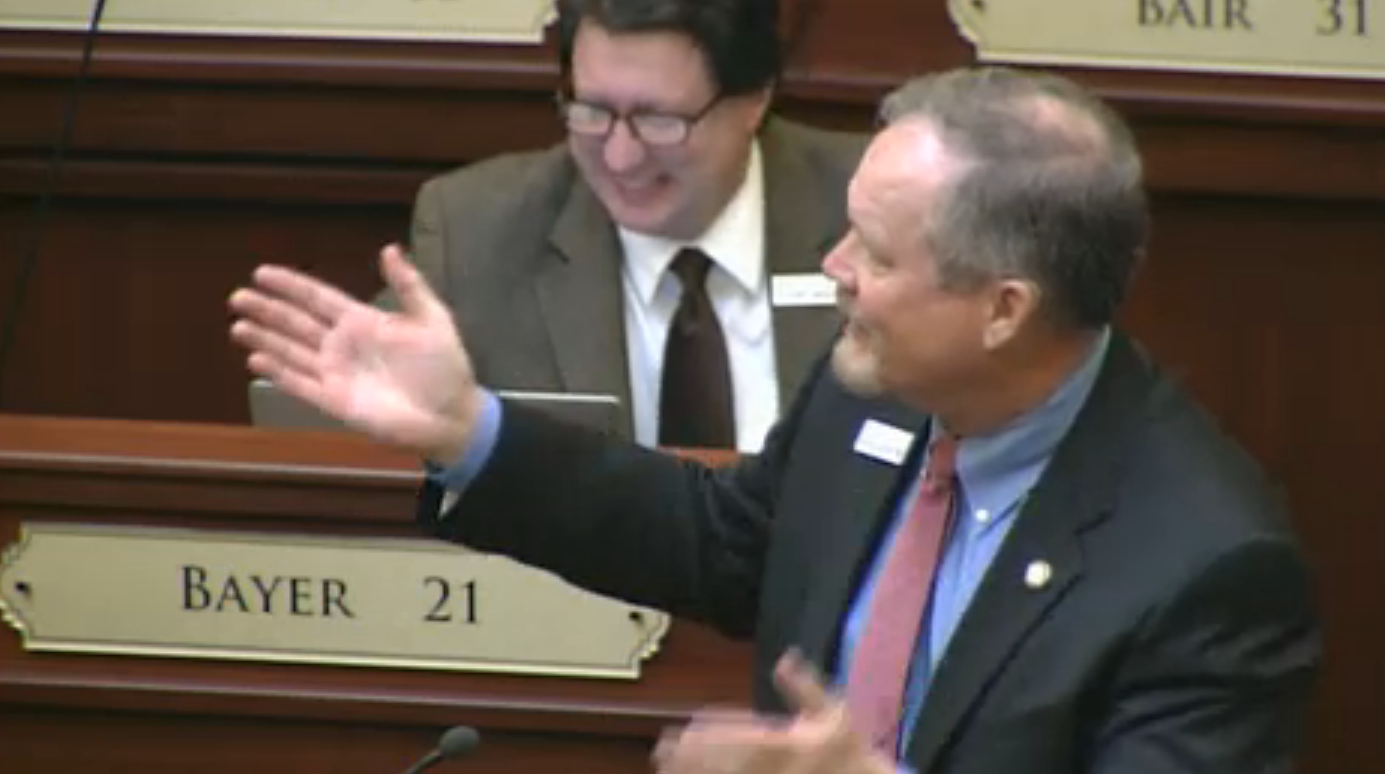(UPDATED, 2:37 p.m. Thursday, with comment from Kloc.)
A late-session bill has surfaced to bring more school elections under the state’s Sunshine Law.

The House State Affairs Committee Tuesday voted to introduce a bill to require sunshine reports for trustee recall campaigns and campaigns for or against school levies and bond issues.
Those campaigns are not covered under the current financial reporting requirements — and it was only last year that the Legislature passed a law requiring trustees’ candidates to file sunshine reports.
Rep. John McCrostie’s bill would add recall elections and school tax issues to this section of sunshine law.
Financial disclosure has become a contentious issue in the recall elections now targeting three West Ada trustees. Supporters of the trustees have accused recall organizers of tapping into a reservoir of special-interest contributions — a claim recall organizers dismiss as baseless.
The sunshine bill is not really a reaction to the West Ada campaign, said McCrostie, D-Garden City. It is instead an incremental step toward bringing more elections under the sunshine law — by focusing on elections that can easily be added to the existing law covering school board elections.
Sen. Mary Souza, R-Coeur d’Alene, pushed for a sweeping bill to extend the sunshine law to all local elections. The Senate State Affairs Committee rejected the bill last month.
McCrostie’s bill survived a brief challenge in committee. Rep. Pete Nielsen, R-Mountain Home, questioned the need to cover more school elections. “It hasn’t been explained very well to me.”
Nielsen made a motion to hold the bill in committee, killing it. Ultimately, he appeared to be the only committee member to support the motion.
Moments later, the committee voted to introduce McCrostie’s bill, which may come back for a full hearing.
In other Statehouse action Tuesday:
Broadband bills. The state’s Board of Examiners approved paying off more legal fees from the Idaho Education Network debacle.
The board — comprising Gov. Butch Otter, Secretary of State Lawerence Denney and Attorney General Lawrence Wasden — OK’d spending $930,593.17, plus interest, to cover legal fees. (Betsy Russell of the Spokane Spokesman-Review covered this morning’s Board of Examiners hearing; here’s a link to her report.)
The money would go to Syringa Networks, the Internet vendor that successfully sued to overturn the $60 million high school broadband contract. On March 1, the state Supreme Court upheld a district court ruling and said Syringa was eligible for legal fees.
Tuesday’s vote sets the stage for the Joint Finance-Appropriations Committee to write a spending bill covering Syringa’s legal costs. Rep. Maxine Bell, R-Jerome, JFAC’s House co-chair, has said she expects the Legislature to cover Syringa’s legal fees.
(For a look at the other high-stakes implications from the Supreme Court ruling, here’s a link to our recent coverage.)
Literacy. A big piece of the literacy initiative is headed to Gov. Butch Otter’s desk.
The Senate voted 35-0 to pass House Bill 526. It’s the policy piece of a suite of bills designed to provide extra reading help for kindergartners through third-graders. Students scoring below basic — the lowest score on the Idaho Reading Indicator — would receive 60 hours of reading help. Students who receive a basic score on the IRI, also below grade level, would receive 30 hours of intervention.
It would be up to districts to figure out a plan for providing extra help; options include optional all-day kindergarten.
Senate Education Committee members, Republican and Democrat, took turns praising HB 526 as a first step to get elementary school students reading at grade level.
For the Legislature, the next step is paying for the literacy program. JFAC is expected to go back and write a literacy budget bill, and it’s unclear how much the committee will put into the plan. Otter has requested $10.7 million — which translates to an additional $290 for every kindergartner through third-grader who is struggling with reading.
School security. Several senators clearly — and vocally — agonized over the decision. But in the end, the Senate voted to create a state office that will inspect schools for school security issues.
House Bill 514 follows up on the limited school inspections carried out in the wake of the December 2012 Newtown, Conn., school shootings. Under the bill, the state’s Division of Building Safety would hire a staff of five people to focus on security breaches, including three roving experts who would inspect all of the state’s schools on a three-year rotating basis.

The division already inspects schools annually, looking for structural problems. But this staff doesn’t have expertise looking for security shortcomings. “We need consistency throughout Idaho schools,” said Sen. Marv Hagedorn, R-Meridian, the bill’s sponsor.
Several senators objected to the cost of the bill — an added $270,000 a year — and questioned the need to create a new Office of School Safety and Security.
No senators actually debated against the bill. But eight exercised the Senate prerogative to offer 60-second explanations of their votes.
After the explaining, the bill passed 26-8. It now goes to Otter’s desk.
Parental rights. A bill designed to highlight parents’ rights in education easily cleared its final legislative hurdle.
The House voted 66-1 to pass Senate Bill 1293, which would allow parents to object to any educational activity that “harms the child or impairs the parents’ firmly held beliefs.”

“It encourages school to invite parents into a partnership on their child’s education,” said sponsoring Rep. Sage Dixon, R-Ponderay.
The lone vote against the bill came from Rep. Hy Kloc, D-Boise. In an email Thursday, Kloc said he supports parents’ rights, but he doesn’t believe parents should pull their kids out of a class or activity simply because the parent disagrees with the topic.
The bill previously cleared the Senate 32-2 on March 7. It next heads to Otter’s desk.
College scholarships. The Senate will tweak a bill that would provide college scholarships for students who complete dual-credit classes while in high school.
House Bill 477 would provide state scholarships to students who compile college credits or an associate’s degree while in high school. Scholarship recipients must secure matching scholarships and attend college in Idaho.
Sen. Steven Thayn, R-Emmett, moved to send the bill to the Senate’s amending order, to clarify wording on the matching scholarships. However, once a bill goes to the floor for amendment, any senator can propose any change to the wording.
HB 477 passed the House last week, with no dissenting votes.
Idaho Ed News reporter Clark Corbin contributed to this report.
